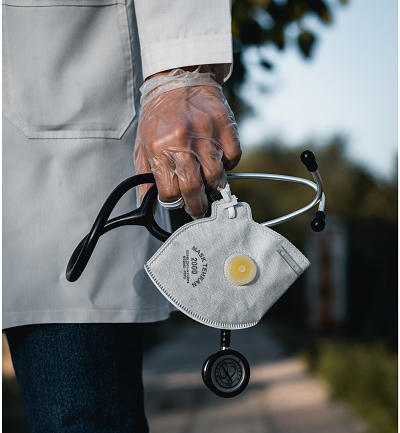When the Wave Comes: Evidence-Based Strategies to Help Frontline Health Care Workers Build Resilience During the COVID-19 Pandemic
When the Wave Comes: Evidence-Based Strategies to Help Frontline Health Care Workers Build Resilience During the COVID-19 Pandemic

Experts suggest that the surge of COVID-19 patients is still coming for many hospitals in the United States and throughout the world. Health care workers on the frontline are waiting for a wave, a wave of unknown height and unknown force to hit the hospitals. In some areas that wave has already begun. Faced with harrowing tales from Italy and China, hospitals count supplies, teams shift staffing schedules, and providers fear the worst.
Working within high stress environments is familiar for emergency room and intensive care staff. Frontline health care workers have been trained to maintain focus and perform complicated procedures while responding to gunshot wounds, heart attacks, and patients coding. Yet, the COVID-19 pandemic introduces a new challenge, a chronic stress and pervasive uncertainty that threatens both the physical and mental health of frontline workers.
Prior research conducted after the SARS epidemic suggests that 68% of frontline health care workers experienced a high level of stress. More recently, an article published by JAMA found that during the coronavirus outbreak in China nearly one in every two health care workers reported clinically concerning levels of depression and anxiety. Further, 71% surveyed health care workers reported significant psychological distress.
Even after the wave hits and reported cases begin to drop, mental health ramifications will abound. Two years after the SARS outbreak in Toronto, health care workers who responded to the outbreak reported elevated levels of professional burnout, traumatic stress, anxiety, and depression. The good news is that there are evidence-based skills that can build resilience and prevent the development of serious mental health conditions.
Slow down
When faced with threat, we experience a physiological response that is biologically adaptive. Activation of a part of the brain called the limbic system triggers biological changes that prepares us to flee, fight, or freeze. Our heart rate increases and muscles tense increasing the likelihood of survival. When the threat subsides, our biological state returns to normal. Yet, the threat of COVID-19 has become chronic. Frequent and prolonged hyperarousal of the mind and body can result in restlessness, fatigue, and difficulty concentrating. To be able to best respond to patients and protect personal health, it is important to slow down the limbic system response when facing chronic stress.
One way to slow down is to identify our thoughts, emotions, and behaviors (TEB). This practice is the core of Cognitive Behavioral Therapy (CBT), an evidence-based treatment with hundreds of studies demonstrating efficacy across a range of disorders and populations. Neuroimaging research shows that naming our emotions is related to activity in the prefrontal cortex, a brain region responsible for high-level processing and the dampening of the limbic system response. Taking a brief moment to identify how we are feeling and what we are doing creates an emotional pause to slow down before facing the next patient or entering the house after a long day at work. For more information, Harvard Medical School recently released a webinar series with a demonstration of how to identify thoughts, emotions, and behaviors related to COVID-19.
Establish healthy habits
One of the many challenges faced by frontline health care workers are the frequent shifts in routine as surges in patients require reallocation of staff and resources. Schedule shifts pose a threat to stability and normalcy that provided a sense of security and comfort. In the changing tides, maintaining a routine is paramount to mental health.
The relationship between regular eating, sleeping, and exercise and mental health is well established. One research study suggests that 62% of people under stress report eating more or less than usual. Fluxes in food make cause spikes or drops in blood sugar that can inhibit our ability to concentrate and perform well. Moreover, sleep deprivation has been shown to interfere with cognition and increase amygdala activity, one of the core regions responsible for hyperarousal. Similarly, limited exercise has been shown to be related to depression symptoms.
In addition to impacting mental health, irregular sleeping, eating, and exercise impact immune functioning. To protect both mental and physical health during these unprecedented times, practice healthy habits by planning meals, turning off the news and putting down the phone before bed, and finding time each day to move your body. Like the battery in a car, we need to move to stay charged. The new norm we are facing warrants a new rhythm, not necessarily a bad one.
Stay connected
In an effort to protect families, friends, loved ones, and co-workers many health care workers are self-isolating or physically distancing themselves from others. Distancing efforts are critical for flattening the curve and reducing the spread of infection, but pose a significant risk to wellbeing. Finding creative ways to stay connected during the pandemic builds resilience and protects mental health.
Prior research suggests that strong social support and connection is a significant predictor of positive mental health outcomes after an outbreak. Social support has many forms including listening, sharing advice, and helping others. Throughout the world people are finding creative ways to give and receive support. Consider connecting with extended family over Zoom to play a game of trivia, calling a friend to share your experiences, or dropping off food at someone’s house. The key is to purposefully and regularly connect by scheduling activities that include others.
And finally, remember that you are not alone. Throughout the world, health care workers and frontline staff are feeling the emotional weight of this pandemic. And, throughout the world, individuals, organizations, communities, and countries have extended support. The threat is real and duration uncertain, but there are proven strategies to navigate the emotional wave ahead. We applaud those one the frontline for protecting our physical health and encourage all to practice these strategies to protect their own mental health.
For more resources and information about how to build resilience and cope with the emotional toll of COVID-19 visit the ADAA Coronavirus Resource Page













